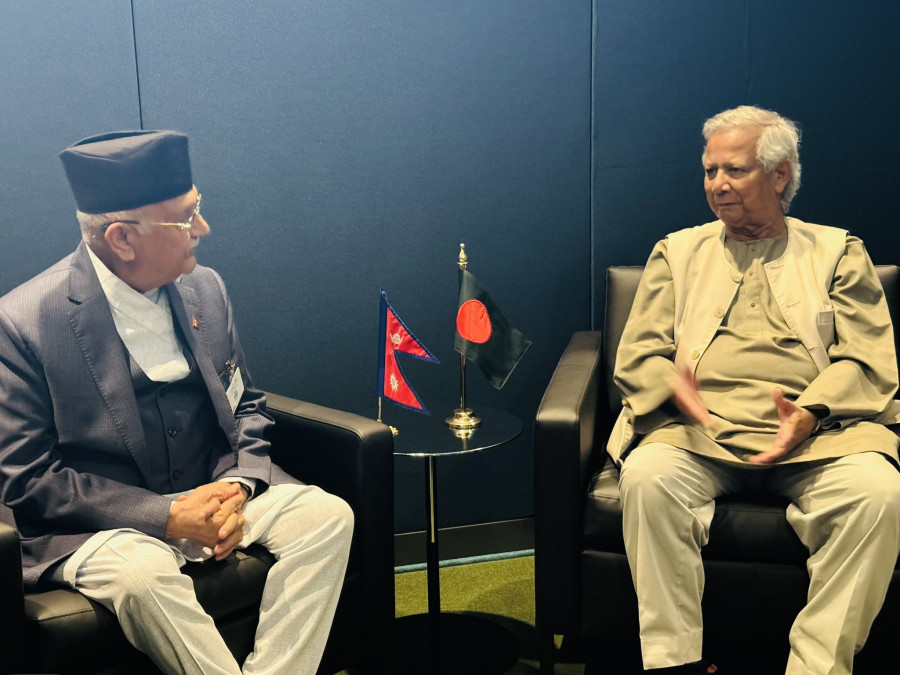National
Prime Minister Oli holds talks with Bangladesh chief adviser in New York
The prime minister engages in climate advocacy and health equity discussions at UN meetings and events.
Post Report
Prime Minister KP Sharma Oli, who is in New York to attend the 79th United Nations General Assembly (UNGA), met Bangladesh Chief Adviser Muhammad Yunus on Wednesday local time.
The prime minister said he discussed Nepal-Bangladesh relations with a focus on enhancing energy and transit cooperation and boosting tourism.
“Discussed Nepal-Bangladesh relations, focusing on energy and transit cooperation, tourism, cultural exchanges, educational ties and cooperation in regional/multilateral forums,” Prime Minister Oli said in a post on X.
Nepal, India and Bangladesh had earlier agreed to sign an agreement on July 28 on the export of Nepal’s 40MW of electricity to Bangladesh via India.
However, the scheduled event, which was suddenly deferred indefinitely due to the political change in Bangladesh, has yet to take place.
Officials from the Nepal Electricity Authority (NEA), the Bangladesh Power Development Board (BPDB) and the NTPC Vidyut Vyapar Nigam Ltd (NVVN) of India were scheduled to sign the agreement at a function in Kathmandu.
It was agreed that with the signing of the agreement, the NEA would export 40MW hydroelectricity to Bangladesh from June 15 to November 15 every year.
Meanwhile, Alice Albright, the CEO of Millennium Challenge Corporation (MCC), paid a courtesy call on the prime minister on the sidelines of the UNGA.
During the meeting, various matters of bilateral interest between Nepal and the US and MCC projects in Nepal were discussed.
“We look forward to early completion of the project for high-quality connectivity through transmission lines and highways,” the prime minister said in a post on X.
Bishnu Rimal, the chief political adviser to the prime minister and Foreign Secretary Sewa Lamsal, among others, were also present during the meeting.
The prime minister addressed a high-level plenary meeting to address the threats posed by rising sea levels.
Addressing the meeting, the prime minister called for adoption of an integrated approach, a ‘mountain to sea’ initiative in our climate actions, recognising the inherent connections between these ecosystems.
“Their coverage should span from Everest to the Indian Ocean, from the Pamirs to the Pacific, and from the Andes to the Atlantic Ocean, recognising environmental and ecological inter-linkages,” he said.
Prime Minister Oli said we must take bold, decisive actions to limit the global temperature rise to 1.5°C. “This is not just a number—it is the threshold for survival,” he said.
Calling for collective global effort to tackle rising sea levels, to build resilience in our nations, and to adapt to the changes, he said hand-in-hand, we must control release of pollutants that generate acidic clouds and other effects as the pristine glaciers are turning into the depository of various contaminants.
“Most importantly, we must deliver climate justice. Wealthy nations must lead from the front to support vulnerable countries,” he said.
Likewise, addressing a programme organised by Mount Sinai Hospital and AMPATH Nepal, the prime minister said that the disparity in health services between developed and underdeveloped countries should be ended.
The prime minister said that despite the vast improvements in science and technology, underdeveloped countries face health infrastructure challenges. “There is a disparity in health care and infrastructure between rich and poor countries. Due to financial constraints, the people of poor countries are not able to get easy and quality healthcare services”, he said,
Similarly, the prime minister called for global climate justice, urging major carbon-emitting nations to take responsibility for their contributions to climate change.
Speaking at the Climate Vulnerable Forum (CVF) Leaders Meeting during the 79th session of the UNGA, Oli emphasised the disproportionate impacts of climate change on vulnerable countries like Nepal.
“Climate change is the defining crisis of our time. Nepal, being a country with young mountains and a least developed one, is facing increased climate-induced disasters at a greater scale and intensity,” he said.
The prime minister highlighted the alarming retreat of glaciers in the Himalayas, noting that the region’s vast reserves of snow, which are critical lifelines for billions of people across Asia, are receding at an unprecedented rate due to rising global temperatures.
Likewise, Prime Minister Oli attended a reception hosted by US President Joe Biden.
Prime Minister Oli joined the heads of state and government of different countries participating in the UNGA at the reception held at the Metropolitan Museum of Arts in New York.
Prime Minister Oli also visited the National September 11 Memorial and Museum at the World Trade Centre Complex, New York. The memorial has been set up in commemoration of the September 11, 2001, attacks on the Trade Towers.




 9.83°C Kathmandu
9.83°C Kathmandu













